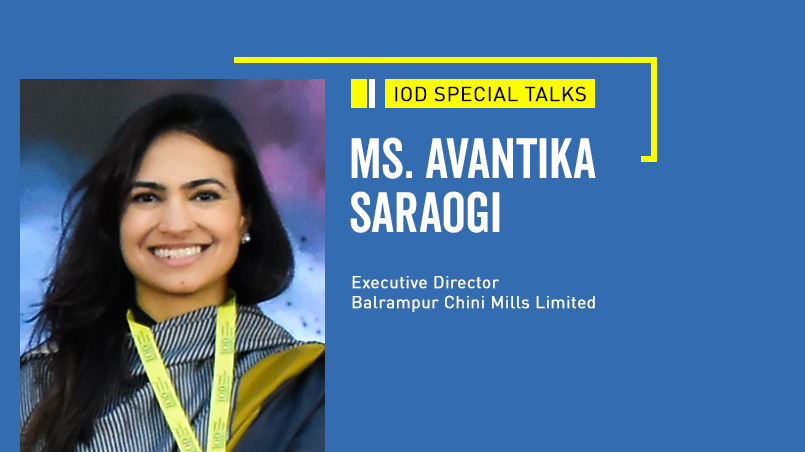 Connect with us
Connect with us

 Aug 05, 2024
Aug 05, 2024
Revolutionizing Green Innovations in the Sugar Industry
I will just start by talking a little bit about our company and how we look at green growth.
Balrampur Chini is one of India's largest sugar mill companies. We have 10 locations, five distilleries, and around 175 MW of exportable green power. We have always been in the business of not wasting a drop of anything. For example, sugar cane is 70% water and 30% biomass. We have actually, in three of our factories, stopped the use of groundwater for the production of sugar as well, and it will extend to all 10 in the next two years. The biomass we use for our power generation is also bagasse, so it's renewable. Before ESG was even a thing, we have been doing these things for business. I am here to exemplify that green growth can be sustainable and very profitable.
We started with only sugar but expanded to other products. The next thing we added on was bagasse based power (a fibrous material that's left over after crushing sugarcane stalks to extract their juice), which otherwise lied in heaps outside of the factories. In fact, when I was a child and I visited my grandmother in the factories, I knew we were getting close when I could smell the heaps of bagasse from a kilometer away. As a further value addition, today our bagasse is also used to make paper and disposable foodware. Our second product was molasses, and now it is used for making ethanol as well as portable alcohol. Press mud is the mud that comes along with sugar cane to the factory. Today, press mud is being used to generate compressed biogas (CBG). It is essentially a waste to wealth story, when we talk about the sugar industry.
We also capture carbon dioxide from fermenters, convert it into liquid and dry ice, and sell it to the beverage and cold chain industries. So it's green CO there as well. Additionally, the ash that comes out of our 2 incinerator boiler is very high in potassium, with about 20% potash.
Green growth can be sustainable as well as profitable.
We granulate that and sell it as a bio-potash fertilizer to farmers and IFFCO as well
Let's talk about the journey a little bit.
In 2001, we were one of the pioneers in setting up cogeneration power in India. As you can see, it has been added to every single factory, and with every expansion, we are now exporting around 175 MW of power.
We announced India's first ever bioplastic plant of industrial scale as of February this year. We can enable industries that want to reduce their plastic usage.
I have touched upon molasses already, but I want to elaborate a bit more. Due to the government's ethanol blending program in automobiles, I think most people are aware, but just to highlight, as of May of this year, India has already achieved a 15% blend of ethanol in normal petrol, without many people even knowing it. This program, which started in 2014 at a mere 1% to 1.5%, is now at 15% today. The Prime Minister's commitment is that in the next 2 to 3 years, it's going to be 20%. This has given us a shot in the arm, and we went hammer and tong behind it. Now we are the largest producers of ethanol in the country. From molasses, as well as sugar juice itself, no sugar is wasted; all sugar is utilized in one of our plants.
I want to talk a little bit more about the water-waste part of our operations. The first point is about the condensation polishing unit, which ensures zero liquid discharge in our distilleries. This has been in place since 2015. We don't extract any water from the ground, only the make-up water for loss, 1% or 2% maximum, and the rest is just recirculated in the process. So, our industry happens to be green, and I think, we are on the right side of the spectrum. Sugar has been battered for a long time. We've been in the business for 50 years, and I think that finally, the time is now for the industry.
Technology transformation has helped us convert five of our sulfitation units into refinery units, which produce sulfur-free sugar. This reduces chemical consumption and makes the sugar healthier.
Other than this, we have green power. Earlier, we were wasteful about it because we didn't know any better, but now, as technology improves and machinery becomes more energy-efficient, we've been in the process of making technology successful in the sugar industry. So, we have the highest bagasse savings that any company could boast of in the industry. This bagasse, is used in paper and foodware. Since there was a ban on single-use plastic, and foodware could no longer be made of plastic, our bagasse is used to create that.
Coming to the main point, we announced as of February of this year, India's first-ever bioplastic plant of industrial scale. It will have a CAPEX of over 2000 crores and a capacity of 75,000 tonnes. We will be making plastic from sugar cane or sugar. This will be a huge step in the netzero roadmap and decarbonization roadmap for the country. We can enable industries that want to reduce their plastic usage. It might not be suitable for everything, but for many things, it would be. We will be on stream in 2026, and before that, we will still be able to provide material from the technology suppliers.
About why did we get into this? The ethanol program was good. But why this? In fact, the shareholders asked this question every time. We believe that we don't want to be dependent on one green solution when the world is moving to green. This solution is scalable, and the industry can adopt it as well. It's not just going to be limited to us. In fact, bioplastics were mentioned in the interim budget as well. So we do see a policy coming in for this.
I just want to highlight that all the big companies have some plastic commitments. At the moment, everybody is committed to recycled plastic, but recycled plastic is usually more expensive and sometimes, not up to the quality of virgin plastic, which makes it hard to use recycled plastic. Now, bioplastics could be a solution. Today, yes, it is a bit more expensive, but in the long run, as production scales, the cost of carbon largely remains the same - whether it's fossil based or bio based. So it will come to a point where bioplastics will be at the same cost as regular plastic, maybe even better because companies like us don't even need coal or gas to produce it, and we use our own bagasse, so that is cheaper as well. The point of highlighting this is to show that green growth can be sustainable as well as profitable. This is the premise on which the project was conceived: that we need to move away from the use-and-throw economy to the fossile based a bio-circular economy.
The bioplastic we are producing, known as PLA, is chemically recyclable using only 8% of the energy demand compared to chemically recyclable polyethylene or polypropylene, which are the largest used plastics in the world. Secondly, it is compostable in industrial conditions, so all the biogas plants and anaerobic digestion processes can handle it with wet waste. I believe that Ahmedabad is already setting up one, and I think other cities will follow suit. Under State scheme, they get approximately 90 per kg of biogas, which is quite profitable.
The third thing is mechanical recycling, which is the most predominant form of recycling in India. Even if our plastic goes with other plastics due to the lack of segregation, it does not harm or affect the recycling stream. It can be broken down and used again in society.
So, overall, this bioplastic is both bio-based and biodegradable under certain conditions. There are many other bioplastics in the world. The applications for PLA and it's compounds. are very diverse and easy to use. Examples include straws, disposable cutlery, cups, garbage bags and female hygiene products. These are already coming up in the world, and I would be happy to answer any questions related to this or the industry.
Thank you so much for your attention.

Excerpts from the 'Special Address' delivered by Ms. Avantika Saraogi, Executive Director, Balrampur Chini Mills Limited in 'Session-III' of the th 25 International Conference on Environment Management and Climate Change, held on June 27, 2024 in Hotel The Lalit Ashok, Bengaluru.
Owned by: Institute of Directors, India
Disclaimer: The opinions expressed in the articles/ stories are the personal opinions of the author. IOD/ Editor is not responsible for the accuracy, completeness, suitability, or validity of any information in those articles. The information, facts or opinions expressed in the articles/ speeches do not reflect the views of IOD/ Editor and IOD/ Editor does not assume any responsibility or liability for the same.
About Publisher

Bringing a Silent Revolution through the Boardroom
Institute of Directors (IOD) is an apex national association of Corporate Directors under the India's 'Societies Registration Act XXI of 1860'. Currently it is associated with over 30,000 senior executives from Govt, PSU and Private organizations of India and abroad.
View All BlogsMasterclass for Directors
Categories